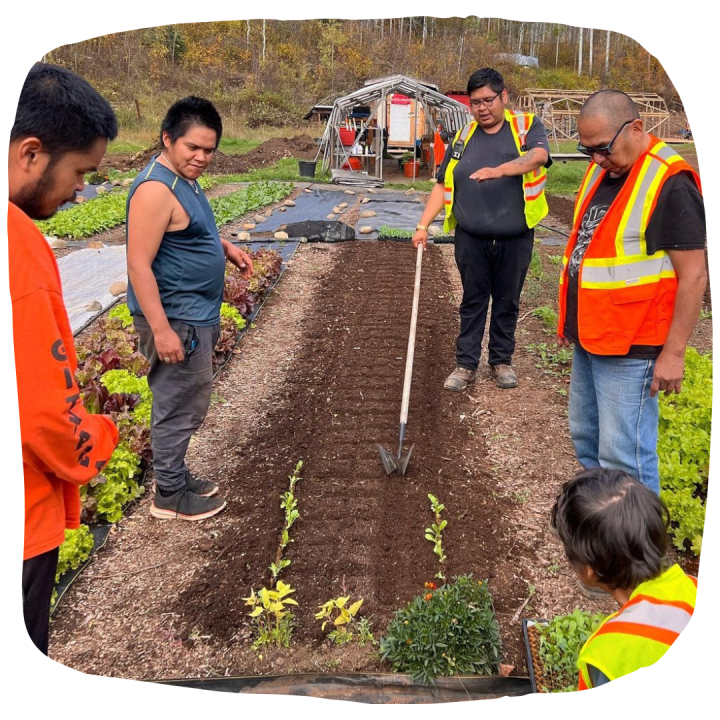
- This event has passed.
Indigenous Food Sovereignty with Jacob Beaton
March 15, 2023 @ 5:00 pm - 7:00 pm

Do you want to learn about Indigenous Food Sovereignty? Join for an in-depth conversation with Jacob Beaton, an award-winning Indigenous entrepreneur and leader!

In this conversation we’ll be diving into what Indigenous Food Sovereignty means and how to make it a reality. Jacob Beaton, who operates Tea Creek Farm in Kitwanga, BC, will be leading the discussion and sharing his own work starting a farm that puts land-based Indigenous food sovereignty at its centre.
We’ll discuss concrete steps to fight systemic racism and how to increase our own awareness of Indigenous food sovereignty and advocate for it more broadly. We hope you can join for a rich and engaging conversation!
INDIGENOUS FOOD SOVEREIGNTY WORKSHOP DETAILS
Date: Wednesday, March 15, 2023
Time: 5pm PT, 6pm MT, 7pm CT, 8pm ET, 9pm AT
Location: Online! Link will be sent out after registration. The workshop will be hosted on Treaty 6 territory.
Cost: Tickets are offered on a sliding scale, suggested $1-$30 contribution. No one turned away for lack of funds: use code FREE in the field above to reveal a free ticket option.
Funds raised will go towards programs for new & young farmers in Canada in 2023.
The event is offered on a sliding scale payment, which means that you are able to select how much you pay to participate when you register. If you’d like to learn more, please go to “What is sliding scale payment? Why do we use it?”.
“To address Indigenous food security and sovereignty, the understanding of Indigenous worldviews and foodways is imperative. For many Indigenous communities, land is more than just property; it encompasses culture, identity, relationships, ecosystems, social systems, spirituality, and law. It is a common belief amongst Indigenous communities that their land is part of their origin story. As a result, Indigenous peoples often hold ecological and spiritual relationships with food-providing plants and animals. Knowledge and traditions on agricultural cultivation skills are often passed down through generations and rituals, songs, and ceremonies are often performed in gratitude for the co-creation of non-human beings. Rather than a ‘product’ or ‘resource’ to be exploited, food is seen as a “gift from the Creator”, which has great cultural and spiritual significance.”
(Overcoming Policy Barriers to Indigenous Food Sovereignty in Vancouver’s Downtown Eastside: A Feasibility Study, Shawn Fang, Shadow Feng, Desiree Gabriel, 2021)
SPEAKER BIO
 Tea Creek is operated by Jacob Beaton, an award-winning Indigenous entrepreneur and leader with previous business successes under his belt. Jacob holds the traditional name Dzap’l Gye’a̱win Skiik, meaning a busy eagle, or an eagle who gets things done.
Tea Creek is operated by Jacob Beaton, an award-winning Indigenous entrepreneur and leader with previous business successes under his belt. Jacob holds the traditional name Dzap’l Gye’a̱win Skiik, meaning a busy eagle, or an eagle who gets things done.
Jacob Beaton and Jessica Ouellette were nominated and then selected by the United Nations (UN) Food and Agriculture Organization (FAO) to represent Canada as Food Hero on World Food Day in 2022.
TEA CREEK FARM
Tea Creek is an award-winning Indigenous-led, culturally-safe, land-based Indigenous food sovereignty and trades training initiative.
Our vision is resilient healthy local Indigenous communities and economies built on land-based programs and abundant local food

Tea Creek transforms people’s lives by building their confidence, skills, and self-esteem. Tea Creek offers a place for Indigenous people to heal and build their skills and self-confidence. Tea Creek catalyzes livelihoods and revitalizes the ability of Indigenous nations to be self-sufficient and economically resilient.
Our Mission is to revitalize the culture of economic interdependence and food production that was a central part of life for Indigenous peoples throughout the Americas.
The Tea Creek Model is a unique, timely, and cutting-edge collection of principles, models, and systems that gets better results and delivers a wide array of valuable outcomes for Indigenous people through Food Sovereignty. The model includes our manifesto and can be adapted to suit the needs of different Nations in different locations. It naturally combines and delivers:
- Physical health outcomes
- Mental, spiritual, emotional health outcomes
- Employment readiness and positive work outcomes
- Skills training, mostly in the area of trades and administration
- High food and medicine production
- Cultural revitalization and strengthening
The model started with the idea that holistic hands-on learning on a farm is more effective than classroom learning for most people. We then layered in many of our learnings and business systems from past businesses where we employed Indigenous people and worked for First Nations.
